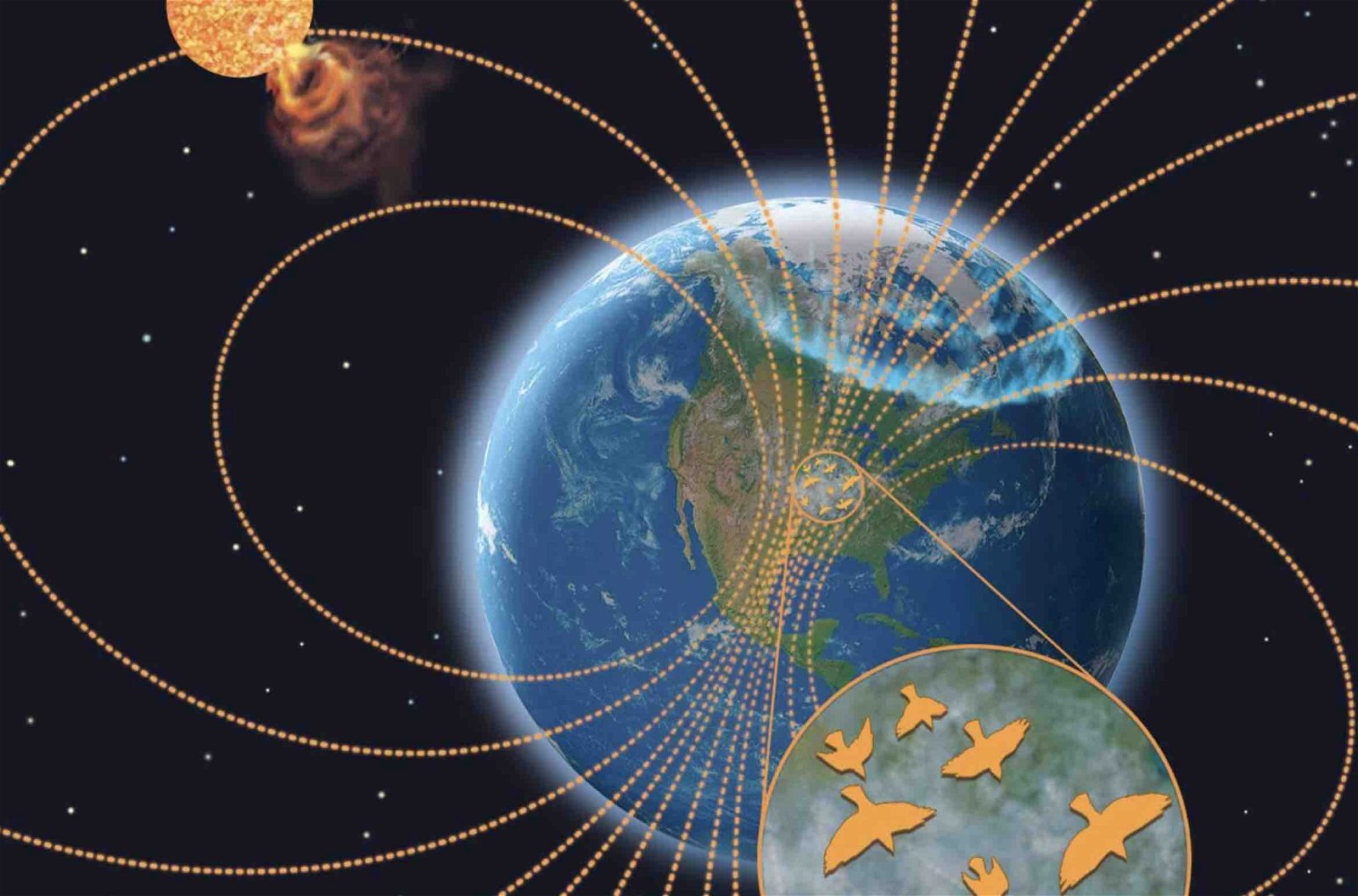Scientists report that energetic outbursts and other space weather phenomena are impacting our planet’s magnetic field, causing disruptions severe enough that the migrational patterns of nocturnal birds and other animal behavior are being affected, according to new research.
The findings point to solar flares and other high-energy cosmic bursts as the prime sources disrupting the Earth’s magnetic field, causing birds and potentially other animals who depend on it for navigation to dramatically alter their normal behavior.
Birds and Other Animals Tap Into the Earth’s Magnetic Field for Navigation
For decades, scientists suspected that animals with long migratory patterns use more than landmarks to navigate across vast distances, relying instead on a hidden ability to sense the earth’s magnetic field. These suspicions were evenutally proven correct, with studies revealing that animals ranging from sharks, who use it like an underwater GPS, to sea turtles and insects, all seemingly possess a sixth magneto-receptive sense.
Now, multi-disciplinary research involving a side-by-side comparison of bird migration and space weather analysis indicates that many of the birds who possess this ability are periodically thrown off by the effects of space weather on our planet’s magnetic field.
Powerful Force from Space Critical to Normal Animal Behavior
To determine if the effects of solar flares and other high energy bursts in space on the planet’s magnetic field trickle down to the animals who depend on it most, a research team from the University of Michigan (U-M) looked back at decades of space weather and migration information.
Specifically, the team focused on long-term data sets from U.S. Doppler weather radar stations for bird tracking data and ground-based magnetometers for the magnetic data. Magnetometers are devices that sense changes in magnetic fields caused by extreme events. In this case, the data originated from a worldwide network known as superMAG.
After cross-checking this data against known occurrences of solar activity strong enough to affect the magnetic field, the team then checked their results against the known bird migration patterns. For this analysis, they used a massive 23-year-long data set of bird migrations across the U.S. Great Plains. Sure enough, according to a press release from the researchers involved, “they found a 9%-17% reduction in the number of migrating birds, in both spring and fall, during severe space weather events.”
“We found broad support that migration intensity decreases under high geomagnetic disturbance,” said study senior author Ben Winger, assistant professor in the U-M Department of Ecology and Evolutionary Biology and a curator of birds at the U-M Museum of Zoology.
Furthermore, they found that the birds that tried to brave these changes and migrate anyway “seemed to experience more difficulty navigating, especially under overcast conditions in autumn.” As a result, many migrating birds get lost, something researchers call “vagrancy.”
“Our findings highlight how animal decisions are dependent on environmental conditions—including those that we as humans cannot perceive, such as geomagnetic disturbances—and that these behaviors influence population-level patterns of animal movement,” explained the study’s lead author, Eric Gulson-Castillo, a doctoral student in the U-M Department of Ecology and Evolutionary Biology.
The effects were particularly high in nocturnal migrating birds, which the study notes “key into small changes in magnetic inclination, intensity, and declination” of the Earth’s magnetic field to navigate when visual cues are limited or unavailable.
First of its Kind Analysis of the Effects of Space Weather on Animal Behavior
While previous studies have noted the effects solar flares have on things like satellite networks and mobile phone communications networks, and others have looked at how animals use the Earth’s magnetic field for navigation, this is the first effort to look at the link between the two. The study did not look at the effects of solar flare activity on other migrating animals that use the Earth’s magnetic field for navigation, but based on the results, it is likely that sharks, sea turtles, and even some insects may be altering their behavior due to these magnetic field changes.
The researchers included 1.7 million radar scans of bird migration patterns from the fall and 1.4 million from the spring, with many radar scans containing data on hundreds of thousands of migrating birds. Combined with the magnetic field data collected from the superMAG network of worldwide magnetometer stations, the study presents a large, robust data set supporting the team’s conclusions that space weather is affecting animal behavior.
“Our results suggest that fewer birds migrate during strong geomagnetic disturbances and that migrating birds may experience more difficulty navigating, especially under overcast conditions in autumn,” said Gulson-Castillo. “As a result, they may spend less effort actively navigating in flight and consequently fly in greater alignment with the wind.”
Christopher Plain is a Science Fiction and Fantasy novelist and Head Science Writer at The Debrief. Follow and connect with him on X, learn about his books at plainfiction.com, or email him directly at christopher@thedebrief.org.

